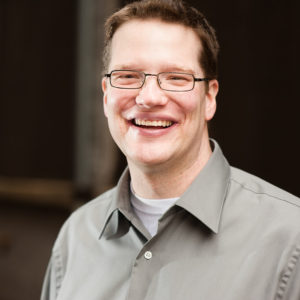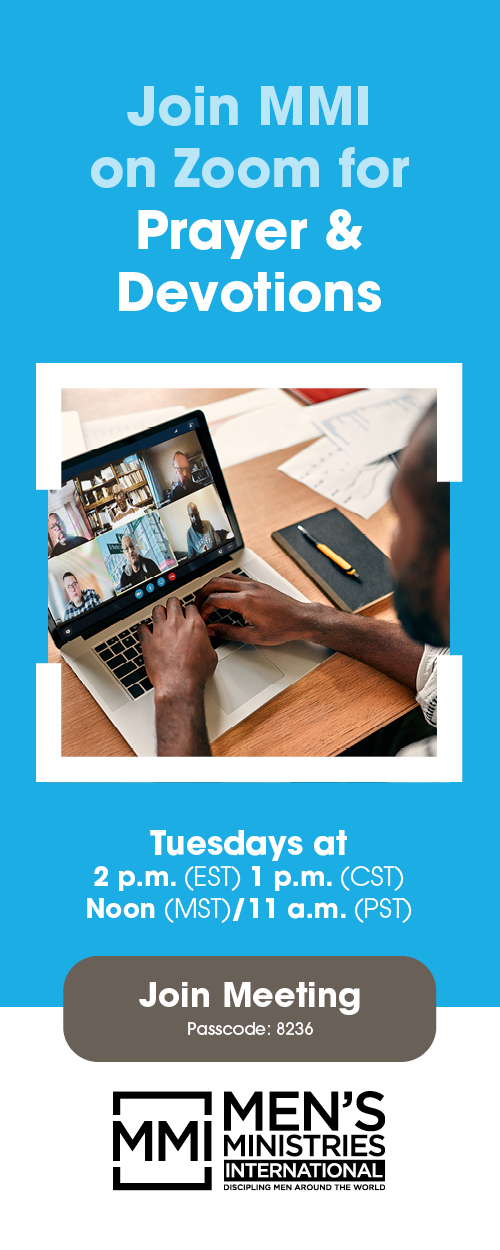
Jeff Finley
Light + Life Executive Editor
Jeff Finley is this magazine’s executive editor. He joined the Light+Life team in 2011 after a dozen years of reporting and editing for Sun-Times Media. He is a member of John Wesley Free Methodist Church where his wife, Jen, serves as the lead pastor.
by Jeff Finley
Some Christians try to avoid justice issues amid our world’s divisiveness, but we can’t encounter God without encountering justice.
“God is a God of justice,” according to Fraser Venter, who recently was appointed by the Board of Bishops to serve as the Free Methodist Church USA’s strategic catalyst for love-driven justice. “He sits on a throne that’s very clear on mercy and justice. When we worship Him and surround Him, the very foundation that He is upon is what He’s called us to. I think He acted that out through Jesus very clearly. He showed us what the presence of God would look like manifested on the earth acting justly, loving mercy, walking humbly.”
While the world offers competing visions of justice, Free Methodists must pursue justice that is driven by love and rooted in prayer and worship, according to participants in the National Prayer Summit Online 2022 that devoted its final session to “Hunger and Thirst for Justice.”
Grounded in Goodness
Bishop Matt Whitehead kicked off the discussion of justice by quoting Luke 2:20, “The shepherds returned, glorifying and praising God for all the things they had heard and seen, which were just as they had been told.”
“The shepherds were declaring God’s faithfulness,” Whitehead explained. “As a movement, we declare God’s faithfulness, and in this call to love-driven justice, we are grounded in the goodness of God — in the faithfulness of God as He has called us as a people to live out this value.”
The bishop also cited Luke 4:16–30 that tells of Jesus going to the synagogue in Nazareth.
_
“We’re called to preach the reality of who Jesus is.”
_
“This was his hometown. These are people who knew Him, that grew up with Him, and they hand Jesus the scroll of the prophet Isaiah, and He opens up the scroll to the 61st chapter, and he reads these words: ‘The Spirit of the Lord is upon me, because He has anointed me to preach good news to the poor. He has sent me to proclaim freedom for the prisoners and recovery of sight for the blind, to release the oppressed, and to proclaim the year of the Lord’s favor,’” Whitehead said. “Jesus says that He has come to preach, to proclaim and to release, and our message today is the same. We’re called to preach the good news of the kingdom. We’re called to preach the reality of who Jesus is. We’re called to proclaim God’s goodness and what it means to live in light of the call to the abundant life and the eternal life.”
Jesus also came to bring release. Whitehead said it’s our responsibility to recognize that people remain in bondage in modern times.
“As Free Methodists, we believe that this call to love-driven justice drives us to the margins, drives us to the oppressed, and causes us to live out this important value,” said Whitehead, who added that God wants to use the Free Methodist Church “to passionately, prayerfully proclaim this message of love-driven justice. I want to thank you for your partnership in prayer. There isn’t anything significant that is going to happen that isn’t bathed in prayer.”
Passion, Presence and Prayer
Light + Life Communications Director and National Prayer Ministry Co-Director Brett Heintzman asked Venter “to help us connect the dots between spiritual hunger and thirst, prayer, and biblical justice.”
_
“Presence can promote our long-term goal, and presence is only found in prayer.”
_
Venter reflected on Matthew 5:6, “Blessed are those who hunger and thirst for righteousness, for they will be filled.” In the biblical text, the word righteousness can also mean justice, and Jesus’ words seem to invoke the words of Isaiah “because there’s such a parallel between that idea of God’s righteousness and His justice.”
Justice “raises everyone’s idea, anxiety or passion, and yet we forget that passion cannot promote what we desire as our long-term goal,” Venter said. “Presence, though, can promote our long-term goal, and presence is only found in prayer.”
Some people link justice with activism. Venter said that as an undergraduate student, he “had a lot of passion for justice issues, holding up signs, speaking really loud.” However, he later realized, “I didn’t do the inner work. I didn’t have Jesus at that point. The inner work shows me now that our God has a heart for justice.”
A Seat at the Table
Hunger and thirst lead people to the table.
“People come to the table with all kinds of agendas. They have their own menu set and their own preferred course, and, in many ways, they’re demanding from the server what they really want,” said Venter, who served for the past 25 years as the lead pastor of Cucamonga Christian Fellowship in Rancho Cucamonga, California. “What we see in Scripture, though, is a different kind of table that God is moving us towards for hunger and thirsting. So when it comes to the idea of coming to the table, Jesus is really clear: ‘Don’t sit at the best seat. Sit in the last seat, and then I will promote you.’
“Many times on the topic of justice, we’re wanting to sit at the very top seat, because we’re more concerned of being right rather than being loving,” he continued. “When we hunger and thirst, we’re actually sitting at a different table. We’re sitting at the table with Jesus to determine what is His agenda. We recognize injustice as rooted deeply from our sin issues, so I want to hear from the one who can remedy sin on how He can remedy injustice. We’ve got to come to the table hungering and thirsting for Him.”
Venter described prayer as the pathway. He also noted that the Israelites sent their worshippers first when they went to war, and the quest for justice has seemed like a battle.
“But we recognize that we don’t fight against flesh. We are armed for spiritual warfare,” he said. “Therefore, worship and prayer seem to be the most important priority for the issue of love-driven justice. If we’re not a people of presence, we will not hear the whispers of heaven on what God has called us to do.”
In Isaiah 6, the prophet “enters into the throne room, and he is set aback because he sees the very presence of the holiness of God,” said Venter, who added that Isaiah cries, “Woe is me! The circumstances are too big. They’re too incredible.”
God graciously responds by sending a burning coal to heal and cleanse Isaiah, whose ears are then opened to hear from heaven what should be done and who will be sent.
“Many of us are feeling like we are sent into the justice issue, but we don’t have any of the secrets of heaven on how to do the strategy of it,” Venter said. “Prayer and presence are the foundations of love-driven justice.”
While pastoring, Venter has also served since 2018 as a superintendent of the Free Methodist Church in Southern California. He expressed gratitude for Free Methodists everywhere who have been actively involved in justice issues.
_
“Instead of focusing on ourselves with an individualistic theology, Christians need to recognize the importance of community.”
_
“I think about the many people that have been serving our denomination already — just giants in the faith,” he said. “I get the privilege of standing on their shoulders, locking arms with them, hearing them — of course, reading about them in our past but really loving those in our presence that have given this voice and blood, sweat and tears.”
He expressed hope that in response to the gospel message, “disciples would not be just disciples, but they would be justice disciples.” Instead of focusing on ourselves with an individualistic theology, Christians need to recognize the importance of community because Jesus “went to great pain to get people at the table — and people that normally were not invited.”
Venter, who earned his Master of Divinity and Doctor of Ministry degrees from Azusa Pacific Seminary, cited theologian Henri Nouwen’s observation that hospitality can quickly change to hostility.
“You have to make a choice in the Spirit of God to say, ‘What kind of table am I presenting with the gospel message? Who am I inviting?’” Venter said. “The bride [of Christ] needs to be reminded: It’s time for us to stop making excuses and to recognize that the marginalized need a place at the table.”
While inviting new people to the table and giving them a voice, he said, we need to “honor and celebrate those who already have a voice and are already doing the great work whether it’s our female leaders or our people of color leaders.”
He expressed excitement for his new role while recognizing Free Methodists “have a long way to go” despite our denominational “DNA as abolitionists.” He said holiness movements tend to drift after the first generation, and “we’re several generations from B.T. Roberts and John Wesley — people that were putting their feet to the ground. We need to come back again to a holy encounter with God — that God’s grabbing our hearts and saying, ‘Enough is enough. The church is not just for you. It’s an open door for people to come, to have a voice, to lead, to experience the holiness of God.’”
He said we shouldn’t give up on the church but instead should desire for its members to “love well” and ask, “God, what seems unjust in your heart?”
“That’s a big question because there are a lot of things on God’s heart that He is broken over, but He’s looking for servants who will pick up the mantle over one issue,” he said. “Become the one that would trumpet God’s justice and love in that space.”
Fraser Venter has been married since 1992 to JoAnne Venter, who works as the director of business development for a national company.
While leading in prayer during the summit, JoAnne said, “I just want to declare in Jesus’ name that the days of us looking inside for answers are over. … Lord, we all must hunger after your presence. We all must hunger and thirst for righteousness and justice.”

Jeff Finley
Light + Life Executive Editor
Jeff Finley is this magazine’s executive editor. He joined the Light+Life team in 2011 after a dozen years of reporting and editing for Sun-Times Media. He is a member of John Wesley Free Methodist Church where his wife, Jen, serves as the lead pastor.









